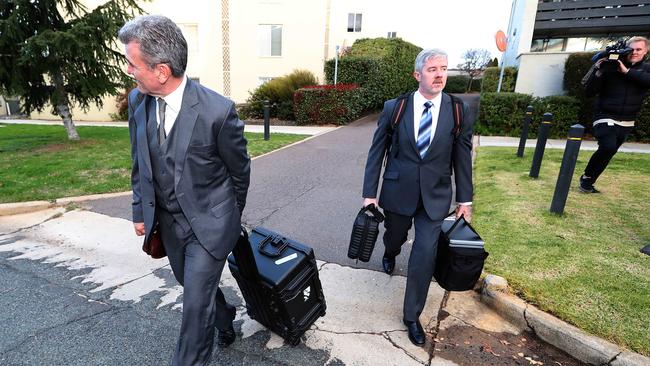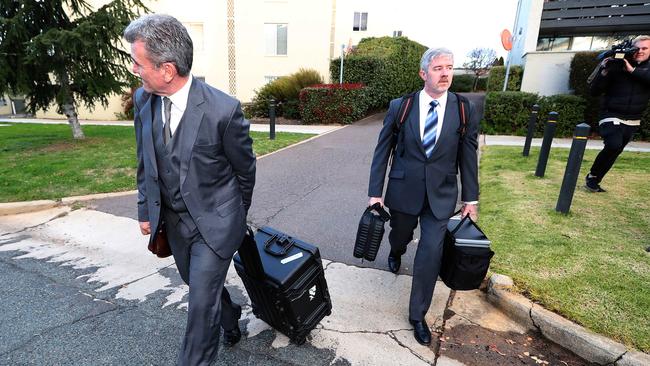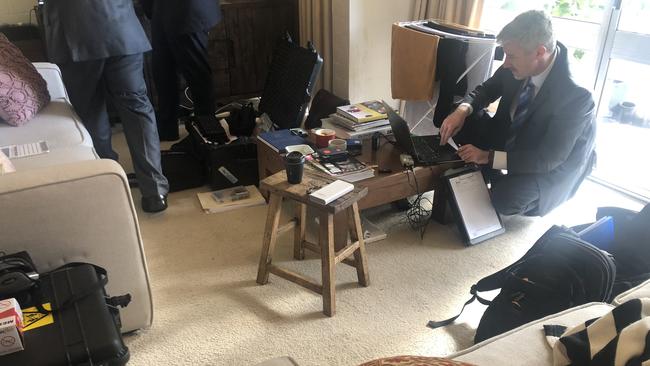Why High Court hasn't deterred government raids on whistleblowers
Top lawyers say the High Court ruling against the AFP's illegal raid on a News Corp journalist is a case of winning the battle but not the war because the judges did not address press freedom or whistleblower protections in Australia.

True Crime
Don't miss out on the headlines from True Crime. Followed categories will be added to My News.
- Alleged bikie hitman wants bail after diabetic coma
- Annika Smethurst: High Court rules police warrant for raid was invalid
Top legal scholars say the High Court's ruling against a police raid on a journalist is an "affirmation" of freedom but warn it won't stop future attacks on those working to uncover government secrets.
One even says there’s now nothing stopping the Australian Federal Police from pouring through the data they illegally seized from News Corp journalist Annika Smethurst.
All seven High Court judges, on Wednesday, found the search warrant used to raid Smethurst’s home was invalid and the raid was unlawful.
But in a four to three decision, the highest court in the land stopped short of ordering the AFP to return the material it had illegally seized from her home.

The judges made the ruling because the warrant did not outline the alleged offence committed by Smethurst with “sufficient precision”.
The court did not go on to consider whether it “infringed the implied freedom of political communication” in Australia.
Macquarie University adjunct law professor George Newhouse called it a “technical knockout”.
But the National Justice Project Founder said the “draconian” laws that “deny Australians the right to know” what their government was up to behind closed doors had not been challenged.
“I think journalists and all Australians should be extremely concerned this decision does not go to the heart or challenge the legitimacy of these extreme laws," he told The Daily Telegraph on Wednesday.
The professor warned there were parties within the government committed to secrecy and overreach.
“It’s obscene – just plain wrong – that our federal police have the power to come into a person’s home and take data and information that relates to matters of importance to our community, it has a chilling effect" he said.

Sydney-based international barrister Peter Lange said the decision added nothing to press freedom or whistleblower protections in Australia because it simply dealt with the warrant.
“It has nothing to do with journalistic freedom, whistleblower rights or protections,” he said.
“The lawyers for (Smethurst) didn’t pursue that argument.”
One justice felt the AFP could apply for a fresh warrant if they wanted to do the raid lawfully.
But, given the police already had the documents and had not been ordered to hand them back, there was no stopping them going through the illegally seized data once the High Court's order take effect.
Despite the potential pitfalls prominent NSW barrister Stephen Lawrence said the High Court had made a “powerful affirmation” that warrants must be worded clearly and not used as a tool against the media.
"This is an important protection of civil liberties because 'general warrants' have been used historically to censor the media and the court has made it clear such warrants are not acceptable in modern Australia,” he said.

Mr Lawrence, who runs the Wigs podcast which examines complex legal issues, said it was still "something of a win" for the AFP because they don't need to hand back Smethurst's documents.
"This means they can retain the material and can attempt to use it in a criminal prosecution," he said.
Professor Newhouse said the High Court ruling meant it was now up to a trial judge – if Smethurst were to be charged – to decide if the illegally obtained documents would be admitted as evidence if prosecution did go ahead.
Mr Lange said accused Australians almost always lost that argument in court and he could only count a handful of cases where a trial judge had refused to allow illegally obtained evidence.
“This decision will be of little comfort to someone who has been illegally searched, as (Smethurst) has,” he said.
The Human Rights Law Centre called for urgent reform of the underlying laws.
“The raids on Annika Smethurst’s home and on the ABC the very next day show we urgently need law reform to protect whistleblowers and public interest journalism,” senior lawyer Alice Drury said.
“There must be greater limits on police powers when they are used to shut down Government scrutiny.”
